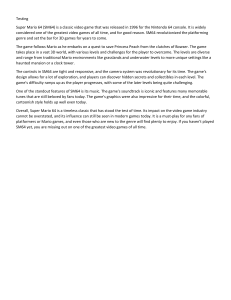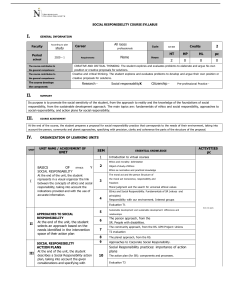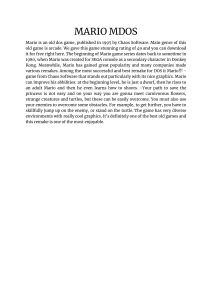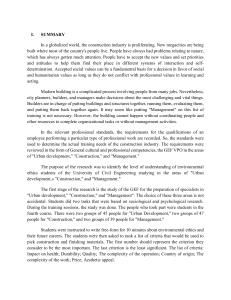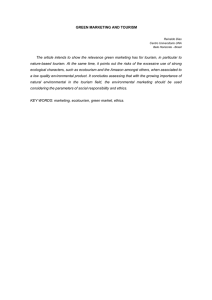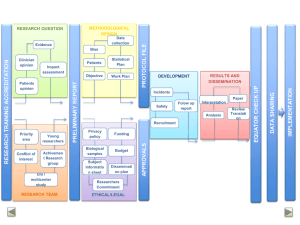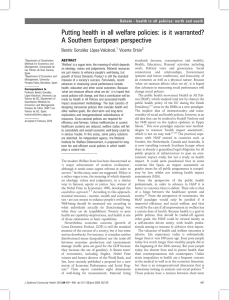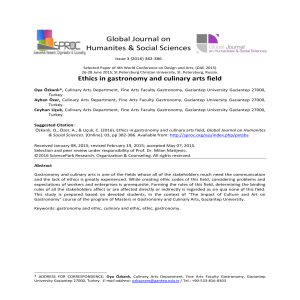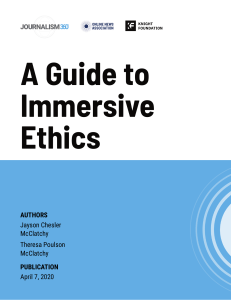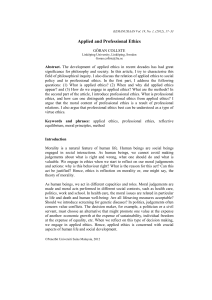A Course in Ethics and Economics - SelectedWorks
Anuncio
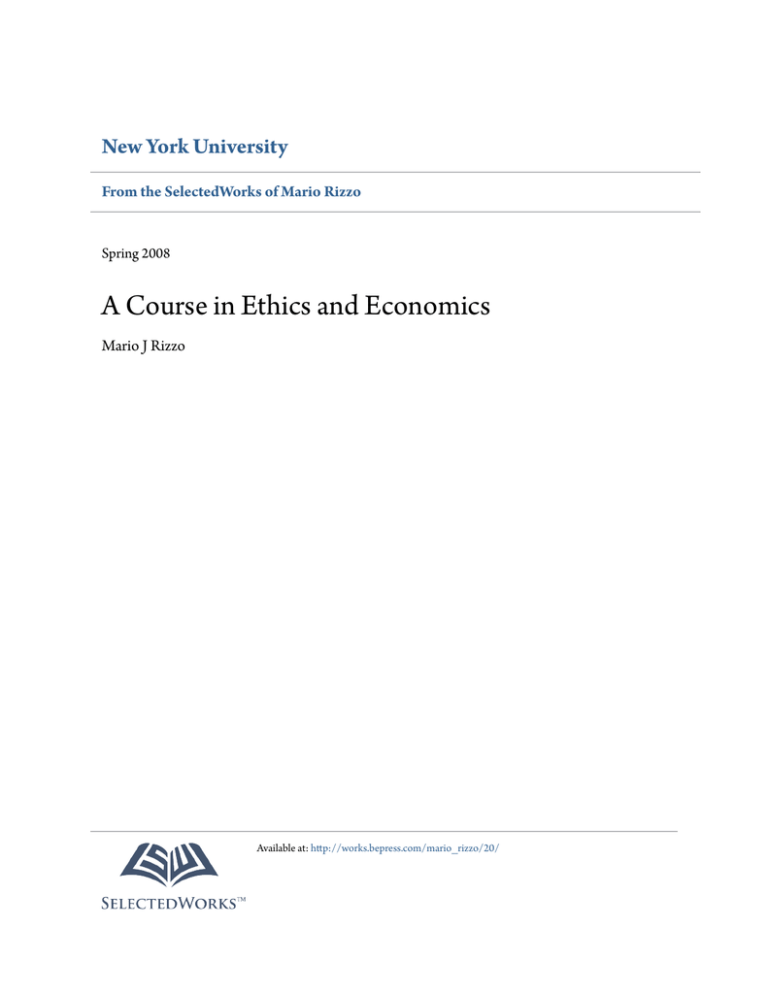
New York University From the SelectedWorks of Mario Rizzo Spring 2008 A Course in Ethics and Economics Mario J Rizzo Available at: http://works.bepress.com/mario_rizzo/20/ NEW YORK UNIVERSITY DEPARTMENT OF ECONOMICS G31. 2007 The Economics of Welfare, Justice and Ethics Spring 2008 Mondays, 4:15-6:15 Mario J. Rizzo [email protected] This course will be organized in a semi-seminar format. This means that, in the main, class sessions will consist of discussions of the assigned readings. However, at times I will lecture on selected aspects of the material. Each week one student will be assigned primary responsibility for introducing the discussion of a particular article or chapter. Nevertheless, everyone should read every assignment before class. I expect that each student will bring a print-out of each article we shall be discussing in each class. Grades will be based on three factors: (1) final exam, (2) short (approx, 10 pages.) term paper and (3) class discussion. The term paper will be due on the last day of the semester. The following notation will be observed regarding the sources of availability of a reading: P = Course packet at the Unique Copy Center. B = Bobst Library Electronic Journals Collection. H = To be handed out. The following book has been ordered through the NYU bookstore and should be purchased: Henry Hazlitt, The Foundations of Morality (Foundation for Economic Education). There is also a packet of readings (not available through the Bobst electronic database) available for purchase at the Unique Copy Center (252 Greene Street, Telephone 212-4209198). Reading assignments will be made as we go along. Some sections will take much longer to cover than others.The assignments for any given week will have been made at the conclusion of the previous week’s class. Please check Blackboard if you miss a class. . Reading Assignments (0) Traditional Views of Relative Domains of Ethics and Economics John Neville Keynes, The Scope and Method of Political Economy (1890), Chap 2. (P) Lionell Robbins, An Essay on the Nature and Significance of Economic Science, 2nd edition (1935), Chap. VI. (P) PART I: POSITIVE ANALYSIS (1) Economic Analysis of Ethical Doctrines and Behavior Henry Hazlitt, The Foundations of Morality (most of the book), chapters assigned as we go along. Digby Anderson, “How Can We Discharge Our Obligations to the Poor?” in D. Cohn-Sherbock and D. McLellan (eds.), Religion in Public Life, pp. 98 – 109. (P) Mario J. Rizzo, “The Problem of Moral Dirigisme: A New Argument Against Moralistic Legislation,” 1 NYU Journal of Law and Liberty (2005), pp. 801 – 807. Available at http://works.bepress.com/mario_rizzo PART II: NORMATIVE ANALYSIS (2) What is Rationality? Viktor J. Vanberg, “The Rationality Postulate in Economics: Its Ambiguity, Its Deficiency and Its Evolutionary Alternative,” 11 Journal of Economic Methodology (2004), pp. 1-29. (B) Daniel M. Hausman, “Revealed Preference, Belief and Game Theory,” 16 Economics and Philosophy (2000), pp. 99 – 115. (B) (3) What is Welfare? L.W. Summer, Welfare, Happiness and Ethics (1996), Chap. 2 (“Welfare and Subjectivity”) and Chap. 3 (“Objective Theories”). (H) Daniel M. Hausman and Michael s. McPherson, Economic Analysis and Moral Philosophy (1996), Chap. 6 (“Welfare”). (H) (4) Utilitarianism: Pro and Con Jeremy Bentham, “The Principle of Utility,” in Peter Singer (ed.), Ethics (1994), pp. 306 – 312. (P) Wesley C. Mitchell, “Jeremy Bentham and the Utilitarian Creed,” in Types of Economic Theory (1967 [1921]), pp. 193-234. (P) J.J.C. Smart, “An Outline of a System of Utilitarian Ethics,” in J.J.C. Smart and Bernard Williams, Utilitarianism: For and Against (1982), pp. 2 – 12; 42-62. (P) John Rawls, “The Seperateness of Persons,” in Peter Singer (ed.), Ethics (1994), pp. 337 – 339. (P) Bernard Williams, “Jim and the Indians,” in Peter Singer (ed.), Ethics (1994), pp. 339 – 345 (P) Tim Warke, “Classical Utilitarianism and the Methodology of Determinate Choice, in Economics and Ethics,” 7 Journal of Economic Methodology (2000), pp. 373-394. (B) (5) What is Paternalism? Gerald Dworkin, “Paternalism,” in Stanford Encyclopedia of Philosophy. Available at http://plato.stanford.edu/entries/paternalism. (6) Psychological and Behavioral Foundations of the “New Paternalism” (a) Preface Richard B. Brandt, “Two Concepts of Utility,” in Morality, Utilitarianism and Rights (1992). (H) (b) Preferencism John Harsanyi, “Utilities, Preferences, and Substantive Goods,” 14 Social Choice and Welfare (1997), pp. 127-145. (B) Richard Thaler and Cass Sunstein, “Libertarian Paternalism,” AEA Papers and Proceedings (May 2003), pp. 175 – 179. (B) Daniel Read, “Which Side Are You On? The Ethics of Self-Command,” 27 Journal of Economic Psychology (2006), pp. 681-693. (B) C) Hedonism Daniel Kahenman, Peter Walker and Rakesh Sarin, “Back to Bentham? Explorations of Experienced Utility,” 112 Quarterly Journal of Economics (1997), pp. 375 – 405. (B) Daniel Read, “Experienced Utility: Utility Theory from Jeremy Bentham to Daniel Kahneman,” Thinking and Reasoning (2006), pp. 1-17. (B)
